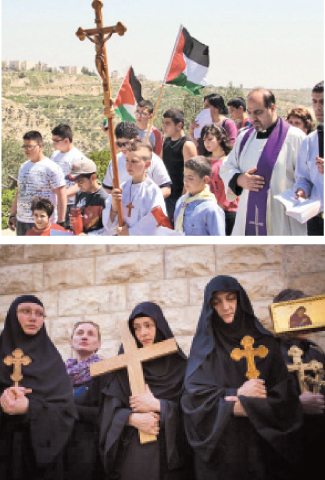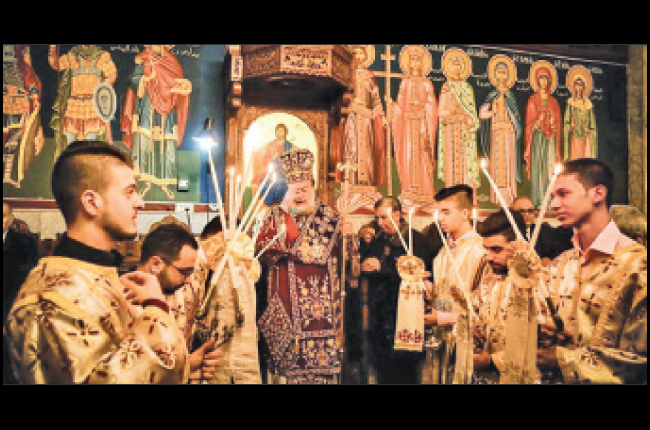The following narrative is not a religious article. Its only aim is to show the unity and coexistence of people, who have been targeted by selfish politicians. It is politicians who desire to divide people under the pretext of regional security and geopolitics.
Palestinian Christians are called the ‘living stones’ of Christianity.They can trace their history to the birth of the Church in this land 2,000 years ago. In fact, they are the oldest Christian population on earth.The world refers to the land of Jesus and the cradle of Christianity as “the land of peace.” The political reality today is quite the opposite.Christianity was born in Palestine two thousand years ago. From there it spread throughout the Middle East and to the rest of the world. Yet many are unaware Christians still live in the land. For decades the Palestinians, Christians and Muslims- have suffered displacement, expulsion, wars, occupation and oppression.There are around 47,000 Christians in Palestine.
The majority are members of Orthodox churches, second most are Roman Catholic, followed by Anglican, Lutheran and others denominations. They enjoy a respected place in Palestinian society, and a status in government, culture and business. These Christians strongly identify as Palestinians with the same culture and history as their Muslim sisters and brothers. In this land, Christians and Muslims have lived together peacefully for many generations.Ninety-eight percent of Palestine’s Christians live in the West Bank – concentrated mostly in the cities of Ramallah, Bethlehem and Jerusalem.
 The Palestinian Christians are the living extension of the first church. For two thousand years, they have faithfully maintained the oldest churches in Christendom. They have preserved the ancient gardens where Jesus prayed, tended and harvested the olive trees that shaded Jesus and his disciples. Now when their communities are besieged and bombed, they have used their sanctuaries to shelter and accommodate the earnest prayer of fellow Palestinians – Christian or Muslim.
The Palestinian Christians are the living extension of the first church. For two thousand years, they have faithfully maintained the oldest churches in Christendom. They have preserved the ancient gardens where Jesus prayed, tended and harvested the olive trees that shaded Jesus and his disciples. Now when their communities are besieged and bombed, they have used their sanctuaries to shelter and accommodate the earnest prayer of fellow Palestinians – Christian or Muslim.
Balfour Declaration
The Christians of Palestine trace their faith to the very first disciples. Nonetheless, some self-righteous folk continue to ask Palestinian Christians “When did you convert?” Unaware, that the Palestinian Christians represent the uninterrupted presence of the very first church.Let’s check some history. Britain captured Palestine in 1917-1918. The League of Nations sanctioned British Mandatory rule in the country. The British issued the Balfour Declaration.The Balfour Declaration, (November 2, 1917), is a statement of British support for “the establishment within Palestine of a national home for the Jewish people.” It was made in a letter from James Balfour, the British foreign secretary, to Walter Rothschild, a leader of the Anglo-Jewish community. This declaration aroused enthusiastic hopes among Zionists.
Later in 1948, tens of thousands of Palestinian villagers were driven from their homes in what was officially dubbed “Operation Broom”, intended to literally sweep tens of thousands of Palestinians from their homes in the fertile hills and valleys of the Galilee, and make way for settlers in the newly created State of Israel.It was carried out by Palmach units. 700,000 Palestinians (Christians and Muslims) left their homes and became refugees during the Arab-Israeli war in 1948.
The narrative of the Palestinian Christians dates back to the very first cross and church. Since the birth of Jesus, the Christians of Palestine have provided fellow Christians an authentic account of the early Christian experience, and their scholars have helped clerics contextualize the bible verses they cite and read. Because of their close proximity and relationship to the first disciples, Palestinian scholars played a critical role in spreading the Christian faith.
Early Christianity flourished in the port city of Maiuma before spreading to the main city of Gaza, a center of Greek learning. In 325, Bishop Asclepas represented Gaza at Emperor Constantine’s famous Council of Nicaea, which established the Nicene Creed that defines the central tenets of Christian belief for most of the world’s Christians today. Twenty-first-century Palestinian Christians include a variety of communities with ties to this early history. When medieval Christian Crusaders reached Jerusalem from Western Europe in 1099, they found not only the Muslims they had come to attack but also these ancient Christian communities. The Eastern and Byzantine branches of Orthodox Christianity grew interms of numbers. Members of the Eastern churches are particularly proud of their long history in the Holy Land.
All too often media coverage of the conflict in Palestine has framed it as a fight between Muslims and Jews, largely ignoring the fact that Palestine was the birthplace of Christianity, that Palestinians are both Muslims and Christians, and that Palestinian Christians have played a critical role in their land’s history and the struggle to maintain its identity.
Faith under occupation
In literature, art, education, politics, academia and social activism, Palestinian Christian names have stood out and made a difference in Palestinian life. One of those was Khalil Sakakini, who pioneered the modern education movement. Khalil Sakakini was born in Jerusalem to a Christian Orthodox family. As a teacher he promoted the learning of the Quran by Christian students as well as Muslims.
The Palestinian national movement after the Nakba was a built-from-scratch mission. One of the key figures of this part of the Palestinian national struggle was Anis Sayegh. Born in Galilee in 1931, Sayegh’s father was a Lutheran pastor.
Sayegh studied political science at the American University of Beirut and then obtained his PhD from Cambridge University. He became involved in the Palestinian movement and pioneered the creation of the Palestinian encyclopedia in 1966. In 1972, the Israeli Mossad tried to assassinate Sayegh with an explosive envelope that was sent to his office.
For decades, Palestinian Christians have been struggling nonviolently for their freedom. In the landmark Kairos Palestine Document – which has been signed by thousands of Palestinian Christians and endorsed by all the Heads and Patriarchs of the Jerusalem Churches – these Christians have issued a powerful call for justice that will lead to real peace. I quote Psalm 34:14 “Seek peace and pursue it”-Holy Bible.
In the past few years Palestinian Christians are leaving because of Israeli checkpoints and barriers that severely restrict the freedom of movement of Palestinians, destroying their economy and preventing their access to their holy places in Jerusalem. The pressure of Israeli occupation, ongoing constraints, discriminatory policies, arbitrary arrests, confiscation of lands added to the general sense of hopelessness among Palestinian Christians.Every year, Gaza’s Christians apply for permits from the Israeli military to join Easter services in Jerusalem and Bethlehem. In 2023 the Israel Police prevented thousands of Palestine Christians from reaching Mount Tabor to mark the Feast of the Transfiguration.
Bethlehem’s 2,000-year-old contiguity with Jerusalem has been cut by a network of Israeli settlements and annexation. Bethlehem is an example of what years of Israeli occupation have meant for Palestine and Palestinians in general, and to the Christians of the Holy Land in particular. Israel officials have used the Bible to justify the Israeli occupation at the United Nations, referencing a “divine right” to make war in Gaza. This is a dangerous trend that aims at turning a political question into a religious war.
History has shown that there is nothing divine in the violation of another people’s rights. It must be understood that Palestinian Christians have been victimised equally as their Muslim brethren. They have also played a significant role in defining the modern Palestinian identity. Palestinian Christians and Muslims have lived together in the region for centuries − and several were killed recently while sheltering in the historic Church of Saint Porphyrius. The Church of Saint Porphyrius, or Porphyry, is named for a fifth-century bishop remembered for building a church in the city against the local temples to the Roman gods. In the early fourth century, the church historian Eusebius of Caesarea commemorated Christians who died in the Roman persecution under Emperor Diocletian, including Christians from Gaza and their bishop, Silvanus, in his “History of Martyrs in Palestine.”
Many opine Israel is keen to present the ‘conflict’ in Palestine as a religious one so that it could, in turn, brand itself as a beleaguered Jewish state amid a massive Muslim population in the Middle East. The continued existence of Palestinian Christians does not factor nicely into this Israeli agenda.
Should we not resurrect the universal message of hope born in Bethlehem 2,000 years ago. Only when human dignity is respected and equal rights are granted and Palestinians – both Muslims and Christians, are able to achieve their full potential in their own land, will they be able to say that peace has returned. I conclude with the words of Jesus Christ (from his Sermon on the Mount) “Blessed are the peacemakers, they will be called the sons of God”.
Dishan Joseph






